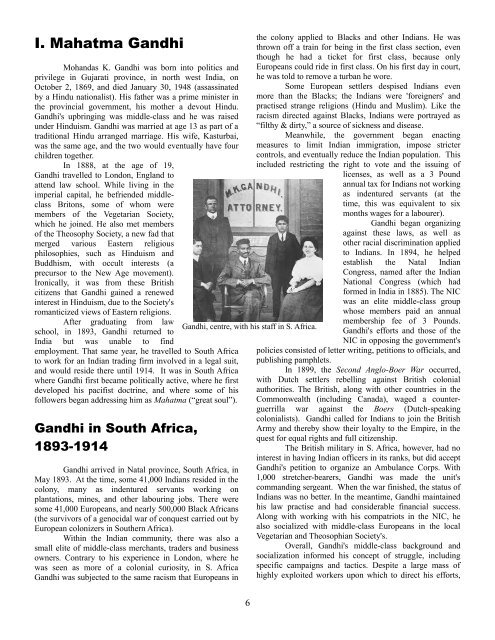Smash Pacifism - Warrior Publications
Smash Pacifism - Warrior Publications
Smash Pacifism - Warrior Publications
Create successful ePaper yourself
Turn your PDF publications into a flip-book with our unique Google optimized e-Paper software.
I. Mahatma Gandhi<br />
Mohandas K. Gandhi was born into politics and<br />
privilege in Gujarati province, in north west India, on<br />
October 2, 1869, and died January 30, 1948 (assassinated<br />
by a Hindu nationalist). His father was a prime minister in<br />
the provincial government, his mother a devout Hindu.<br />
Gandhi's upbringing was middle-class and he was raised<br />
under Hinduism. Gandhi was married at age 13 as part of a<br />
traditional Hindu arranged marriage. His wife, Kasturbai,<br />
was the same age, and the two would eventually have four<br />
children together.<br />
In 1888, at the age of 19,<br />
Gandhi travelled to London, England to<br />
attend law school. While living in the<br />
imperial capital, he befriended middleclass<br />
Britons, some of whom were<br />
members of the Vegetarian Society,<br />
which he joined. He also met members<br />
of the Theosophy Society, a new fad that<br />
merged various Eastern religious<br />
philosophies, such as Hinduism and<br />
Buddhism, with occult interests (a<br />
precursor to the New Age movement).<br />
Ironically, it was from these British<br />
citizens that Gandhi gained a renewed<br />
interest in Hinduism, due to the Society's<br />
romanticized views of Eastern religions.<br />
After graduating from law<br />
school, in 1893, Gandhi returned to<br />
India but was unable to find<br />
employment. That same year, he travelled to South Africa<br />
to work for an Indian trading firm involved in a legal suit,<br />
and would reside there until 1914. It was in South Africa<br />
where Gandhi first became politically active, where he first<br />
developed his pacifist doctrine, and where some of his<br />
followers began addressing him as Mahatma (“great soul”).<br />
Gandhi in South Africa,<br />
1893-1914<br />
Gandhi arrived in Natal province, South Africa, in<br />
May 1893. At the time, some 41,000 Indians resided in the<br />
colony, many as indentured servants working on<br />
plantations, mines, and other labouring jobs. There were<br />
some 41,000 Europeans, and nearly 500,000 Black Africans<br />
(the survivors of a genocidal war of conquest carried out by<br />
European colonizers in Southern Africa).<br />
Within the Indian community, there was also a<br />
small elite of middle-class merchants, traders and business<br />
owners. Contrary to his experience in London, where he<br />
was seen as more of a colonial curiosity, in S. Africa<br />
Gandhi was subjected to the same racism that Europeans in<br />
Gandhi, centre, with his staff in S. Africa.<br />
6<br />
the colony applied to Blacks and other Indians. He was<br />
thrown off a train for being in the first class section, even<br />
though he had a ticket for first class, because only<br />
Europeans could ride in first class. On his first day in court,<br />
he was told to remove a turban he wore.<br />
Some European settlers despised Indians even<br />
more than the Blacks; the Indians were 'foreigners' and<br />
practised strange religions (Hindu and Muslim). Like the<br />
racism directed against Blacks, Indians were portrayed as<br />
“filthy & dirty,” a source of sickness and disease.<br />
Meanwhile, the government began enacting<br />
measures to limit Indian immigration, impose stricter<br />
controls, and eventually reduce the Indian population. This<br />
included restricting the right to vote and the issuing of<br />
licenses, as well as a 3 Pound<br />
annual tax for Indians not working<br />
as indentured servants (at the<br />
time, this was equivalent to six<br />
months wages for a labourer).<br />
Gandhi began organizing<br />
against these laws, as well as<br />
other racial discrimination applied<br />
to Indians. In 1894, he helped<br />
establish the Natal Indian<br />
Congress, named after the Indian<br />
National Congress (which had<br />
formed in India in 1885). The NIC<br />
was an elite middle-class group<br />
whose members paid an annual<br />
membership fee of 3 Pounds.<br />
Gandhi's efforts and those of the<br />
NIC in opposing the government's<br />
policies consisted of letter writing, petitions to officials, and<br />
publishing pamphlets.<br />
In 1899, the Second Anglo-Boer War occurred,<br />
with Dutch settlers rebelling against British colonial<br />
authorities. The British, along with other countries in the<br />
Commonwealth (including Canada), waged a counterguerrilla<br />
war against the Boers (Dutch-speaking<br />
colonialists). Gandhi called for Indians to join the British<br />
Army and thereby show their loyalty to the Empire, in the<br />
quest for equal rights and full citizenship.<br />
The British military in S. Africa, however, had no<br />
interest in having Indian officers in its ranks, but did accept<br />
Gandhi's petition to organize an Ambulance Corps. With<br />
1,000 stretcher-bearers, Gandhi was made the unit's<br />
commanding sergeant. When the war finished, the status of<br />
Indians was no better. In the meantime, Gandhi maintained<br />
his law practise and had considerable financial success.<br />
Along with working with his compatriots in the NIC, he<br />
also socialized with middle-class Europeans in the local<br />
Vegetarian and Theosophian Society's.<br />
Overall, Gandhi's middle-class background and<br />
socialization informed his concept of struggle, including<br />
specific campaigns and tactics. Despite a large mass of<br />
highly exploited workers upon which to direct his efforts,


